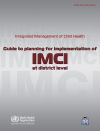IMCI pre-service training or education introduces students to the IMCI strategy. Often what students learn in an educational establishment does not equip them to deal with the “real-world” situations at the different levels of practice. They need to develop common knowledge and skills that are applied in everyday practice. In addition, key paediatrics textbooks used as a reference by teachers and students in developing countries are often from developed countries. This can result in a teaching programme dealing with subjects and skills in an unbalanced way by focusing on rare diseases, sophisticated skills and modern tests while neglecting the most common conditions, skills and attitudes needed in a particular setting.
While many graduates will end up practising at primary health care, paediatric teaching in undergraduate training often tends to focus mainly on inpatient or hospital care, with little room for paediatric outpatient care and home care. Essential skills, such as communication skills, are rarely taught to students, despite the fact that most child care is delegated to families and takes place at home, and the quality of child care relies on the advice child caretakers have received.
As a result, many students may be exposed to information they may be unable to apply in the prevailing working environment in their country and, at the same time, may be unprepared to perform the more common tasks that will be required of them in their daily practice in the real world with the resources available.
Aim
The objective of pre-service training is to prepare a cadre of health providers prepared for the working environment.
Medical education aims at providing knowledge and developing skills and attitudes among students as part of a thorough “education” process, to enable them to think through a differential diagnostic process before formulating a diagnosis and prescribing treatment. Clinical decision rules and standard protocols, such as the IMCI guidelines, are meant to guide this process rather than replace it.
The involvement of departments of family and community medicine in IMCI pre-service training is also very important as it helps establish close links between teaching institutions and the community.
This is very relevant in the Eastern Mediterranean Region, as in many countries medical graduates are required to serve in rural areas before working with the ministry of health or registering with the medical council.
Phases
Introducing IMCI into pre-service education require action at the national and institutional levels. It can be characterized by 4 main phases:
- preparatory and orientation
- planning
- implementation, scaling up and monitoring
- review and re-planning
The preparatory and orientation phase for IMCI pre-service is essential for the sustainability of the initiative and aims at creating at both national and institutional levels a conducive supportive environment for implementation.
Related resources
 |
Guide to planning for implementation of IMCI at district level |
 |
IMCI pre-service education: orientation and planning workshop: facilitator guide |
 |
|
 |
|
 |


